#and getting denied by corporations happy to save money and kill creativity
Explore tagged Tumblr posts
Text
the rise of anti-intellectualism is directly correlated with the exponential growth and popularity of AI generated "art" and "literature". when people never bother to think or care about a creators intentions to begin with (which there ALWAYS are when something is made by a human), then they wont give a shit if a computer is spitting out content without thought or heart. just as long as theyre getting content fast and cheap.
i feel like im watching the demise of the creative in real time.
#i hate watching people push anything AI generated#when there are creatives on the picket line#begging for their talent to not be replaced by ai#and getting denied by corporations happy to save money and kill creativity#and ai 'creators' on insta getting hundreds of thousands of likes for something requires no talent#death to midjourney#death to chap gpt
115 notes
·
View notes
Text
The Mythology of Work: Eight Myths that Keep Your Eyes on the Clock and Your Nose to the Grindstone
What if nobody worked? Sweatshops would empty out and assembly lines would grind to a halt, at least the ones producing things no one would make voluntarily. Telemarketing would cease. Despicable individuals who only hold sway over others because of wealth and title would have to learn better social skills. Traffic jams would come to an end; so would oil spills. Paper money and job applications would be used as fire starter as people reverted to barter and sharing. Grass and flowers would grow from the cracks in the sidewalk, eventually making way for fruit trees.
And we would all starve to death. But we’re not exactly subsisting on paperwork and performance evaluations, are we? Most of the things we make and do for money are patently irrelevant to our survival—and to what gives life meaning, besides.
This text is a selection from Work, our 376-page analysis of contemporary capitalism. It is also available as a pamphlet.

That depends on what you mean by “work.” Think about how many people enjoy gardening, fishing, carpentry, cooking, and even computer programming just for their own sake. What if that kind of activity could provide for all our needs?
For hundreds of years, people have claimed that technological progress would soon liberate humanity from the need to work. Today we have capabilities our ancestors couldn’t have imagined, but those predictions still haven’t come true. In the US we actually work longer hours than we did a couple generations ago—the poor in order to survive, the rich in order to compete. Others desperately seek employment, hardly enjoying the comfortable leisure all this progress should provide. Despite the talk of recession and the need for austerity measures, corporations are reporting record earnings, the wealthiest are wealthier than ever, and tremendous quantities of goods are produced just to be thrown away. There’s plenty of wealth, but it’s not being used to liberate humanity.
What kind of system simultaneously produces abundance and prevents us from making the most of it? The defenders of the free market argue that there’s no other option—and so long as our society is organized this way, there isn’t.
Yet once upon a time, before time cards and power lunches, everything got done without work. The natural world that provided for our needs hadn’t yet been carved up and privatized. Knowledge and skills weren’t the exclusive domains of licensed experts, held hostage by expensive institutions; time wasn’t divided into productive work and consumptive leisure. We know this because work was invented only a few thousand years ago, but human beings have been around for hundreds of thousands of years. We’re told that life was “solitary, poor, nasty, brutish, and short” back then—but that narrative comes to us from the ones who stamped out that way of life, not the ones who practiced it.
This isn’t to say we should go back to the way things used to be, or that we could—only that things don’t have to be the way they are right now. If our distant ancestors could see us today, they’d probably be excited about some of our inventions and horrified by others, but they’d surely be shocked by how we apply them. We built this world with our labor, and without certain obstacles we could surely build a better one. That wouldn’t mean abandoning everything we’ve learned. It would just mean abandoning everything we’ve learned doesn’t work.


One can hardly deny that work is productive. Just a couple thousand years of it have dramatically transformed the surface of the earth.
But what exactly does it produce? Disposable chopsticks by the billion; laptops and cell phones that are obsolete within a couple years. Miles of waste dumps and tons upon tons of chlorofluorocarbons. Factories that will rust as soon as labor is cheaper elsewhere. Dumpsters full of overstock, while a billion suffer malnutrition; medical treatments only the wealthy can afford; novels and philosophies and art movements most of us just don’t have time for in a society that subordinates desires to profit motives and needs to property rights.
And where do the resources for all this production come from? What happens to the ecosystems and communities that are pillaged and exploited? If work is productive, it’s even more destructive.
Work doesn’t produce goods out of thin air; it’s not a conjuring act. Rather, it takes raw materials from the biosphere—a common treasury shared by all living things—and transforms them into products animated by the logic of market. For those who see the world in terms of balance sheets, this is an improvement, but the rest of us shouldn’t take their word for it.
Capitalists and socialists have always taken it for granted that work produces value. Workers have to consider a different possibility—that working uses up value. That’s why the forests and polar ice caps are being consumed alongside the hours of our lives: the aches in our bodies when we come home from work parallel the damage taking place on a global scale.
What should we be producing, if not all this stuff? Well, how about happiness itself? Can we imagine a society in which the primary goal of our activity was to make the most of life, to explore its mysteries, rather than to amass wealth or outflank competition? We would still make material goods in such a society, of course, but not in order to compete for profit. Festivals, feasts, philosophy, romance, creative pursuits, child-rearing, friendship, adventure—can we picture these as the center of life, rather than packed into our spare time?
Today things are the other way around—our conception of happiness is constructed as a means to stimulate production. Small wonder products are crowding us out of the world.
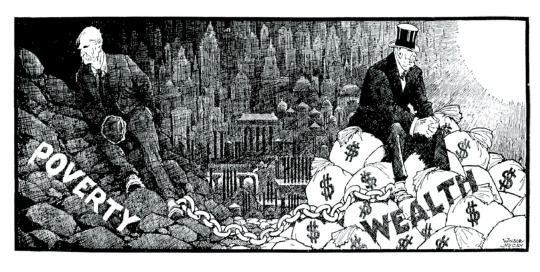

Work doesn’t simply create wealth where there was only poverty before. On the contrary, so long as it enriches some at others’ expense, work creates poverty, too, in direct proportion to profit.
Poverty is not an objective condition, but a relationship produced by unequal distribution of resources. There’s no such thing as poverty in societies in which people share everything. There may be scarcity, but no one is subjected to the indignity of having to go without while others have more than they know what to do with. As profit is accumulated and the minimum threshold of wealth necessary to exert influence in society rises higher and higher, poverty becomes more and more debilitating. It is a form of exile—the cruelest form of exile, for you stay within society while being excluded from it. You can neither participate nor go anywhere else.
Work doesn’t just create poverty alongside wealth—it concentrates wealth in the hands of a few while spreading poverty far and wide. For every Bill Gates, a million people must live below the poverty line; for every Shell Oil, there has to be a Nigeria. The more we work, the more profit is accumulated from our labor, and the poorer we are compared to our exploiters.
So in addition to creating wealth, work makes people poor. This is clear even before we factor in all the other ways work makes us poor: poor in self-determination, poor in free time, poor in health, poor in sense of self beyond our careers and bank accounts, poor in spirit.

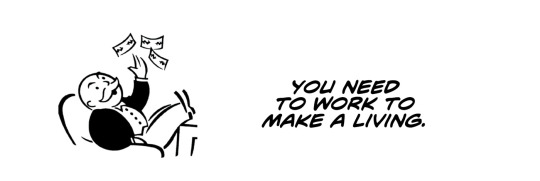
“Cost of living” estimates are misleading—there’s little living going on at all! “Cost of working” is more like it, and it’s not cheap.
Everyone knows what housecleaners and dishwashers pay for being the backbone of our economy. All the scourges of poverty—addiction, broken families, poor health—are par for the course; the ones who survive these and somehow go on showing up on time are working miracles. Think what they could accomplish if they were free to apply that power to something other than earning profits for their employers!
What about their employers, fortunate to be higher on the pyramid? You would think earning a higher salary would mean having more money and thus more freedom, but it’s not that simple. Every job entails hidden costs: just as a dishwasher has to pay bus fare to and from work every day, a corporate lawyer has to be able to fly anywhere at a moment’s notice, to maintain a country club membership for informal business meetings, to own a small mansion in which to entertain dinner guests that double as clients. This is why it’s so difficult for middle-class workers to save up enough money to quit while they’re ahead and get out of the rat race: trying to get ahead in the economy basically means running in place. At best, you might advance to a fancier treadmill, but you’ll have to run faster to stay on it.
And these merely financial costs of working are the least expensive. In one survey, people of all walks of life were asked how much money they would need to live the life they wanted; from pauper to patrician, they all answered approximately double whatever their current income was. So not only is money costly to obtain, but, like any addictive drug, it’s less and less fulfilling! And the further up you get in the hierarchy, the more you have to fight to hold your place. The wealthy executive must abandon his unruly passions and his conscience, must convince himself that he deserves more than the unfortunates whose labor provides for his comfort, must smother his every impulse to question, to share, to imagine himself in others’ shoes; if he doesn’t, sooner or later some more ruthless contender replaces him. Both blue-collar and white-collar workers have to kill themselves to keep the jobs that keep them alive; it’s just a question of physical or spiritual destruction.
Those are the costs we pay individually, but there’s also a global price to pay for all this working. Alongside the environmental costs, there are work-related illnesses, injuries, and deaths: every year we kill people by the thousand to sell hamburgers and health club memberships to the survivors. The US Department of Labor reported that twice as many people suffered fatal work injuries in 2001 as died in the September 11 attacks, and that doesn’t begin to take into account work-related illnesses. Above all, more exorbitant than any other price, there is the cost of never learning how to direct our own lives, never getting the chance to answer or even ask the question of what we would do with our time on this planet if it was up to us. We can never know how much we are giving up by settling for a world in which people are too busy, too poor, or too beaten down to do so.
Why work, if it’s so expensive? Everyone knows the answer—there’s no other way to acquire the resources we need to survive, or for that matter to participate in society at all. All the earlier social forms that made other ways of life possible have been eradicated—they were stamped out by conquistadors, slave traders, and corporations that left neither tribe nor tradition nor ecosystem intact. Contrary to capitalist propaganda, free human beings don’t crowd into factories for a pittance if they have other options, not even in return for name brand shoes and software. In working and shopping and paying bills, each of us helps perpetuate the conditions that necessitate these activities. Capitalism exists because we invest everything in it: all our energy and ingenuity in the marketplace, all our resources at the supermarket and in the stock market, all our attention in the media. To be more precise, capitalism exists because our daily activities are it. But would we continue to reproduce it if we felt we had another choice?
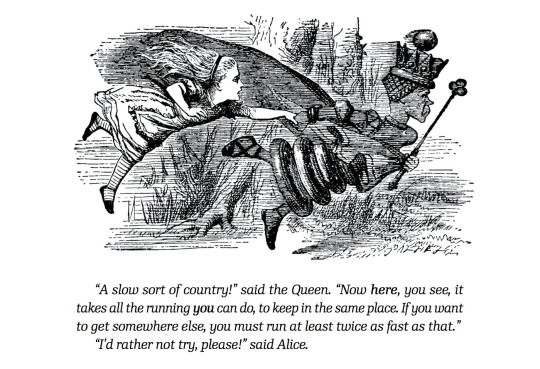
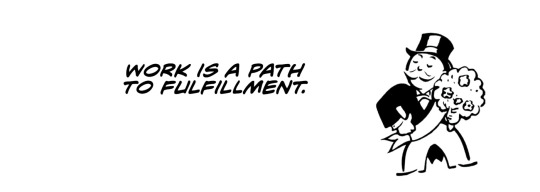
On the contrary, instead of enabling people to achieve happiness, work fosters the worst kind of self-denial.
Obeying teachers, bosses, the demands of the market—not to mention laws, parents’ expectations, religious scriptures, social norms—we’re conditioned from infancy to put our desires on hold. Following orders becomes an unconscious reflex, whether or not they are in our best interest; deferring to experts becomes second nature.
Selling our time rather than doing things for their own sake, we come to evaluate our lives on the basis of how much we can get in exchange for them, not what we get out of them. As freelance slaves hawking our lives hour by hour, we think of ourselves as each having a price; the amount of the price becomes our measure of value. In that sense, we become commodities, just like toothpaste and toilet paper. What once was a human being is now an employee, in the same way that what once was a pig is now a pork chop. Our lives disappear, spent like the money for which we trade them.
Most of us have become so used to giving up things that are precious to us that sacrifice has become our only way of expressing that we care about something. We martyr ourselves for ideas, causes, love of one another, even when these are supposed to help us find happiness.
There are families, for example, in which people show affection by competing to be the one who gives up the most for the others. Gratification isn’t just delayed, it’s passed on from one generation to the next. The responsibility of finally enjoying all the happiness presumably saved up over years of thankless toil is deferred to the children; yet when they come of age, if they are to be seen as responsible adults, they too must begin working their fingers to the bone.
But the buck has to stop somewhere.
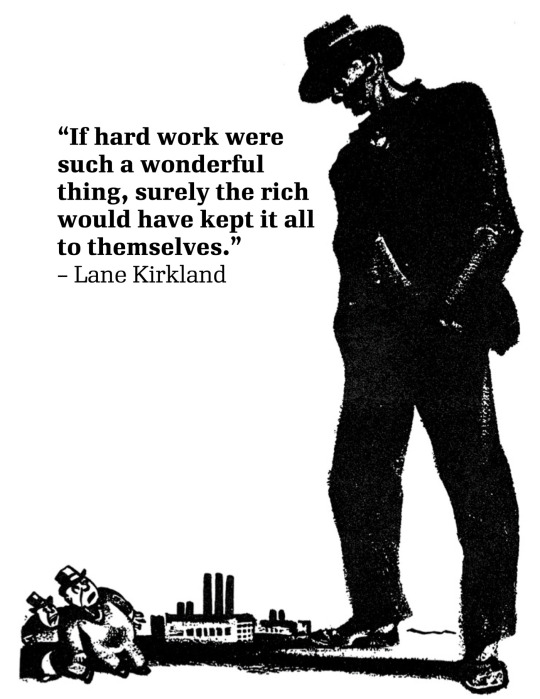

People work hard nowadays, that’s for sure. Tying access to resources to market performance has caused unprecedented production and technological progress. Indeed, the market has monopolized access to our own creative capacities to such an extent that many people work not only to survive but also to have something to do. But what kind of initiative does this instill?
Let’s go back to global warming, one of the most serious crises facing the planet. After decades of denial, politicians and businessmen have finally swung into action to do something about it. And what are they doing? Casting about for ways to cash in! Carbon credits, “clean” coal, “green” investment firms—who believes that these are the most effective way to curb the production of greenhouse gases? It’s ironic that a catastrophe caused by capitalist consumerism can be used to spur more consumption, but it reveals a lot about the kind of initiative work instills. What kind of person, confronted with the task of preventing the end of life on earth, responds, “Sure, but what’s in it for me?”
If everything in our society has to be driven by a profit motive to succeed, that might not be initiative after all, but something else. Really taking initiative, initiating new values and new modes of behavior—this is as unthinkable to the enterprising businessman as it is to his most listless employee. What if working—that is, leasing your creative powers to others, whether managers or customers—actually erodes initiative?
The evidence for this extends beyond the workplace. How many people who never miss a day of work can’t show up on time for band practice? We can’t keep up with the reading for our book clubs even when we can finish papers for school on time; the things we really want to do with our lives end up at the bottom of the to-do list. The ability to follow through on commitments becomes something outside ourselves, associated with external rewards or punishments.
Imagine a world in which everything people do, they do because they want to, because they are personally invested in bringing it about. For any boss who has struggled to motivate indifferent employees, the idea of working with people who are equally invested in the same projects sounds utopian. But this isn’t proof that nothing would get done without bosses and salaries—it just shows how work saps us of initiative.

Let’s say your job never injures, poisons, or sickens you. Let’s also take it for granted that the economy doesn’t crash and take your job and savings with it, and that no one who got a worse deal than you manages to hurt or rob you. You still can’t be sure you won’t be downsized. Nowadays nobody works for the same employer his whole life; you work somewhere a few years until they let you go for someone younger and cheaper or outsource your job overseas. You can break your back to prove you’re the best in your field and still end up hung out to dry.
You have to count on your employers to make shrewd decisions so they can write your paycheck—they can’t just fritter money away or they won’t have it to pay you. But you never know when that shrewdness will turn against you: the ones you depend on for your livelihood didn’t get where they are by being sentimental. If you’re self-employed, you probably know how fickle the market can be, too.
What could provide real security? Perhaps being part of a long-term community in which people looked out for each other, a community based on mutual assistance rather than financial incentives. And what is one of the chief obstacles to building that kind of community today? Work.

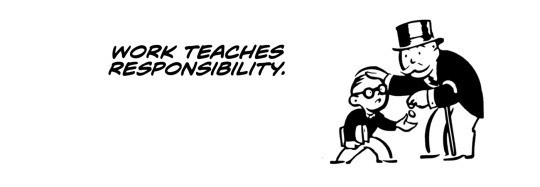
Who carried out most of the injustices in history? Employees. This is not necessarily to say they are responsible for them—as they would be the first to tell you!
Does receiving a wage absolve you of responsibility for your actions? Working seems to foster the impression that it does. The Nuremburg defense—“I was just following orders”—has been the anthem and alibi of millions of employees. This willingness to check one’s conscience at the workplace door—to be, in fact, a mercenary—lies at the root of many of the troubles plaguing our species.
People have done horrible things without orders, too—but not nearly so many horrible things. You can reason with a person who is acting for herself; she acknowledges that she is accountable for her decisions. Employees, on the other hand, can do unimaginably dumb and destructive things while refusing to think about the consequences.
The real problem, of course, isn’t employees refusing to take responsibility for their actions—it’s the economic system that makes taking responsibility so prohibitively expensive.
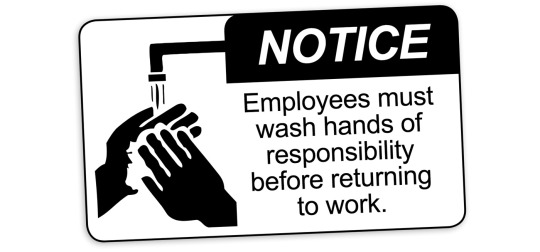
Employees dump toxic waste into rivers and oceans.
Employees slaughter cows and perform experiments on monkeys.
Employees throw away truckloads of food.
Employees are destroying the ozone layer.
They watch your every move through security cameras.
They evict you when you don’t pay your rent.
They imprison you when you don’t pay your taxes.
They humiliate you when you don’t do your homework or show up to work on time.
They enter information about your private life into credit reports and FBI files.
They give you speeding tickets and tow your car.
They administer standardized exams, juvenile detention centers, and lethal injections.
The soldiers who herded people into gas chambers were employees,
Just like the soldiers occupying Iraq and Afghanistan,
Just like the suicide bombers who target them—they are employees of God, hoping to be paid in paradise.


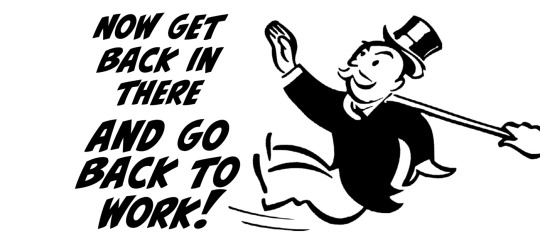
Let’s be clear about this—critiquing work doesn’t mean rejecting labor, effort, ambition, or commitment. It doesn’t mean demanding that everything be fun or easy. Fighting against the forces that compel us to work is hard work. Laziness is not the alternative to work, though it might be a byproduct of it.
The bottom line is simple: all of us deserve to make the most of our potential as we see fit, to be the masters of our own destinies. Being forced to sell these things away to survive is tragic and humiliating. We don’t have to live like this.
219 notes
·
View notes
Video
youtube
UK Student Accommodation Sector in Trouble as Minister Intervenes
By Charles Kelly, Property Solutions Investor, Author of Yes, Money Can Buy You Happiness and creator of Money Tips Podcast.
The Universities Minister laid down a warning to a summit of student-accommodation providers to sort out the "awful and disappointing" problems that have seen more than 20 student housing schemes not completed on time, the BBC reports.
In an unprecedented move, Chris Skidmore summoned corporate housing providers after students had been put into temporary accommodation at the beginning of the autumn term.
"Students can pay significant amounts for their accommodation and it is unacceptable to let them down at a stressful time," the minister said.
Students in Portsmouth were among those affected, when a private housing block was not completed, leaving about 250 without accommodation.
Accommodation is funded from student maintenance loans - which means billions of pounds in public spending goes into the student-housing sector.
Private landlords have been increasingly undermined by the government which has favoured large corporate landlords with tax breaks denied to the smaller student accommodation providers.
Buy-to-let investors have been quitting the market in droves since punitive property tax measures were introduced by the former chancellor George Osborne. Some estate agents claim that Osborne’s landlord tax grab, combined with the 2016 Brexit vote, has effectively killed the buy-to-let property market, with prices in some areas falling by over 20%.
However, plummeting property prices have created buying opportunities, especially among distressed and disgruntled landlords fed up with being treated like second class citizens.
Even property investors I meet who have not sold everything have held back on buying further property due to the loss of tax relief on buy-to-let mortgage loans, as well as higher rates on limited company loans.
But most traditional buy-to-let property investors are not aware of the ‘no money down’ strategies to own or control property without using mortgage lenders.
Smart investors are using these creative finance, ‘no money down’ tools to build massive property portfolios in a few short years, as their hands are not tied by mortgage lenders and the need to save large deposits and pay higher taxes.
If you’d like more information on how to acquire wealth building assets using none of your money, email me at [email protected] or send me a message through Facebook or my Money Tips Daily community.
See more articles at www.moneytipsdaily.com
How to Use Creative Property Financing to Beat the Banks
How to Use Creative Property Financing to Beat the Banks In the last few years, mortgage lending rules have been tightened up by UK regulators. Lenders now dig into your finances far more deeply than just looking at your annual income. Self-certificated mortgages are all but... see -http://www.moneytipsdaily.com/how-to-use-creative-property-financing-to-beat-the-banks/
There are more examples and practical steps to getting rich and being happy in my book, Yes, money can buy happiness, I cover the 3 R’s of Money Management, the Money B.E.L.I.E.F System and much more. Check it out on Amazon http://bit.ly/2MoneyBook.
Word of the Day
Section 24
Section 24, also known as the ‘tenant tax’, will restrict relief for finance costs on residential properties to the basic rate of Income Tax. This has been phased in from 6 April 2017. ... In simple terms, Landlords will no longer be able to deduct all of their finance costs from their property income when calculating their property profits.
0 notes
Text
Mel Feller Looks at Why you Should be Happy Over Giving into Adversity by Mel Feller

Mel Feller Looks at Why you Should be Happy Over Giving into Adversity by Mel Feller
How happy are you? Is it a stressor when you are asked whether you are happy? On the other hand, do you have to work at happiness or do you wake up in the morning in a stellar mood? What if you could take a few simple steps toward happiness and stay away from negativity or adversity?
The power of positive thinking is an incredible power to harness. Here are three steps I, Mel Feller, try to undertake when I need to flip my switch in my brain to “Happy”:
Start the day with reflection. Take the time to reflect on the successes of the prior day and plan for success on the day ahead. Take the time to answer the questions: Who are you? What do you want to do? What makes you happy? Answering these questions will steer you toward positivity and help you to reflect on you own existence and its place in the world. When you’re feeling stressed during the day step away for a few minutes of positive reflection – it will help you get back on track.
Endeavor to make one small change a day, every day. Keeping your brain active and engaged is crucial for happiness and success. Break out of a rut. It could be as simple as shaking up your morning routine to completing a crossword puzzle to learning a new task.
Go with the flow. I struggle almost daily with this one. You need to let go of anger at interruptions and adapt to the changes. Write down those things that are stopping your “flow.” Determine from the items that you have written down, what is within your control, and what is outside of the realm of your control? Knowing which are which will help you more easily let go of those things over which you have no control. Take time for deep, meditative breaths or a quick, relaxing walk.
“What doesn’t kill us makes us stronger”: an impressive statement, but how true is it? Well, according to researchers, emotional adversities such as sadness can ultimately have key psychological benefits, such as increased motivation, better communication and judgements that are more accurate.
Therefore, perhaps this statement is true; a certain amount of adversity in our lives can only make us happier and more resilient in the end! However, it is how we deal with adversity, which is the deciding factor. Read on to discover four types of adversity you may face at some time in your life, plus the best ways to recover from them and regain happiness.
FINANCIAL ADVERSITY
“A happy life consists not in the absence but in the mastery of hardships.” ― Helen Keller
As with any type of adversity, overcoming financial hardship is much easier if you maintain a positive outlook, and one way to achieve this is to have a plan in place. Therefore, whether you find yourself in debt, or are just fed up with living payday to payday, the following tips will help you get back on the road:
Create new habits—to save yourself from financial hardship in the future, you need to change your relationship with money. The Independent has some great ideas to get you started.
Set goals—deal with one task at a time as you sort out your finances. Having goals in place will not only give you a purpose, you will also feel better about yourself each time you tick a goal off your list.
EMOTIONAL ADVERSITY
"The most beautiful people I've known are those who have known trials, have known struggles, have known loss, and have found their way out of the depths.” ― Elisabeth Kübler-Ross
There is no denying that emotional adversity can hit hard and be difficult to overcome, but the key with emotions is to learn how to experience them without letting them overwhelm us. Here are some suggestions to help you get out of your head and back into the world:
Volunteer—helping in the community will take your mind off your troubles, but perhaps more importantly, the act of helping others will improve your mental health in the end.
Do not suppress your emotions—it is easy to struggle with feelings of depression and anxiety in the hope that will make them go away, but research shows that by accepting them, you eventually diminish them of their power.
Meditate—when you are feeling down, meditation can be a wonderful tool to fortify the mind and give you a greater sense of perspective. Similarly, taking a moment out of your hectic schedule to rejuvenate can help you reflect on your feelings. It could be as simple as a wellbeing massage or a trip to a sauna!
PHYSICAL ADVERSITY
“My advice to other disabled people would be, concentrate on things your disability doesn’t prevent you doing well, and don’t regret the things it interferes with. Don’t be disabled in spirit as well as physically.” ―Stephen Hawking
Whether you have a physical disability or an illness that affects your mobility, physical adversity has its own set of challenges to overcome to live a full and happy life:
It is important not to let your physical limitations define who you are. Accept your physical limitations—Doing so will give you room for mental and spiritual growth.
Allow yourself to grieve—if you suppress your sad feelings, it will be harder to heal emotionally, so allow yourself the odd dark day where you grieve for what was. This will help you heal and regain a positive attitude. In addition, do not be afraid to turn to friends and family when feel you need support.
Get out into nature—Going for group walks can make a marked difference in your mood. Find out if any groups meet in your area.
SOCIAL ADVERSITY
“You can’t stay in your corner of the forest waiting for others to come to you. You have to go to them sometimes.” ― A.A. Milne, Winnie-the-Pooh
We are all social creatures, so it is no surprise that when we go through periods of social adversity we feel alone. According to a 2013 study, the average adult’s network of friends and colleagues has dwindled significantly in the last 35 years, and the ensuing loneliness has an impact on health.
If your social life leaves a lot to be desired, it is important that you open yourself up to new friendships. Here is a few ideas to get you started:
Join a club—whether you join a book club, a local orchestra, or a dance class, doing an activity that you enjoy will, increase your chances of meeting people with similar interests and will hopefully lead to new friendships.
Start saying yes—Conquer your social adversity by saying” yes” next time a friend or colleague suggests coffee, or, even better, ask yourself!
As I have just described, with the right attitude and a pinch of resilience, it is possible to overcome adversity. Be sure to show yourself plenty of compassion whilst doing so, and take the time to relax when you feel overwhelmed. Therefore, what will you do to make your day a happier, more productive one? What do you need to do to get back in the flow?
Mel Feller – Personal Development, Business, Executive, Internet and Real Estate Investments Coach/Mentor and Business Owner
Mel Feller was a senior staffer for over 5 years with both United States Senator Jake Garn and The Senate Banking and Finance Committee.
Mel Feller is a speaker at entrepreneurial forums training business professionals on marketing strategies and the “Secrets of Online Marketing”. He provides consulting services on all aspects of business including organizational performance, sales and marketing strategies, employee productivity and retention, successful solution implementation, technology leverage and customer service in all business and fields.
Mel Feller's areas of technology expertise include emails and social media, solution development discipline and methodology, business process leads and project management.
Mel Feller has twenty-five years’ experience with companies, nonprofits and individuals in the research and writing of both government and private grants.
In addition to his regular consulting and management responsibilities, Mel Feller was published in the Top 100 Mentors; he has published two books on "Creative Real Estate Financing" and “Multiple Secrets to Success”, and presented numerous executive lectures for Fortune 500 corporations on “leadership and business practices”.
Visit him at www.melfeller.com and www.melfellersuccessstories.com
Mel Feller’s dynamic presence, instinctive strategic vision, and creative thinking produce effective, sustainable bottom-line results for his clients. His “Can Do” attitude generates confidence in his executive coaching clients and strategic consulting corporate clients. Throughout Mel Feller’s career, he has increased the profitability of nearly every organization with which he has worked.
Mel Feller has a unique ability to relate to his clients because he came from The United States Senate, where Mel was the Chief of Staff for a United States Senator and was always meeting with prominent business people or politicians. His main love was dealing with constituents that were the grass root voters! Since founding Coaching For Success 360 In 1989, he has effectively translated that experience into results for his clients. He focuses on separating daily distractions from the real issues in order to put the executive and/or business on the right path to grow and prosper. Results are immediate, growth sustainable, and profitability long-term.
Dozens of Mel Feller’s clients have been on Inc.’s 500/5000 list and many have been named as a “Best Places To Work.
Using Mel Feller’s intuitive, systematic approach, and our proven strategic and tactical tools, we help you plan for profit.
Mel Feller believes that what gets measured is improved. Therefore, he is continually developing processes and systems that allow you to easily measure, manage and maintain a highly profitable business.
Mel Feller is ready to help you increase your sales, trim and manage your operating costs and see your profits soar and/or leverage your time for Business or Real Estate!
“Truth telling, honesty, and candor: I loved you Mel Feller! You have so much energy and knowledge! I truly hope I get another opportunity to be coached by you. I see myself a little clearer now, and it’s not so bad.”
Lisa Mathews
“Mel Feller you added more value than we can possibly see right now. Mel Feller, you are warm, inviting, and accommodating. Thank you for coming alongside us in this transition!”
Vanessa Cavanaugh
“Mel Feller the best education session that we have attended in many years! Thank you so much — I am very excited to put everything you have taught us into practice!”
Michael Randolph
“Mr. Mel Feller, Thank you, thank you, thank you for giving a marvelous keynote at our Symposium! While we have not yet collected the official feedback, the unofficial feedback was that You Were a Hit! I heard nothing but compliments regarding your presentations. Thank you for making such a positive impact on our attendees! ”
Lyle Cunningham VP
"Mel Feller uses his humor, compassion, and direct nature to help bring out the best in me. Mel Feller is committed to helping me live...I mean, really live, life to its fullest."
Jose Rodriguez
Mel Feller Links
https://www.instagram.com/mel.feller
https://ourmrmel.tumblr.com/
https://www.pinterest.com/cfs360/
https://twitter.com/melfeller
https://wordpress.com/page/melfellerinternetbusinessinnovations.wordpress.com
https://dribbble.com/melfeller
https://biggerpockets.com/forums/79/topics/49008-larry-goins-bootcamp
https://txbusinessdb.com/p/mel-feller
https://xindex.com/c/12031660488/mel-feller-financial-services-group-inc
https://buzzfile.com/business/Coaching-For-Success-940-569-9260
https://melfellerrealestateinnovations.wordpress.com
https://myspace.com/mfcfs360
https://goodreads.com/user/show/86266194-mel-feller
https://mfcfs.contently.com
https://alignable.com/wichita-falls-tx/coaching-for-success-360
https://quora.com/profile/Mel-Feller
https://about.me/melfeller
https://independent.academia.edu/MelFeller
https://medium.com/@mfcfs360
https://melfellerentrepreneurialideas.wordpress.com
https://about.me/melfeller
https://thecoachingoffice.com
https://quora.com/profile/Mel-Feller
https://linkedin.com/pulse/reflections-journaling-mel-feller-mel-feller
https://creonline.com/finally-my-first-deal
https://etrainingguide.com
https://reitips.com/open-letter
https://thecoachingoffice.com/testimonials.html
https://fortunebuilders.com/student-success-old/testimonials/page/9
https://agrandpaslove.blogspot.com
https://plus.google.com/u/0
https://youtube.com/channel/UCk_zDXJgadnWwmab0PhaIkQ/videos
https://linkedin.com/in/mel-feller
https://challengesinlife.com
https://melfellersuccessstories.com
https://melfeller.com
https://www.slideshare.net/MelFeller
#adversity#physical adversity#financial adversity#mental adversity#happiness#being happy#mood#mel feller#melfeller#coaching for success#coaching for success 360
0 notes